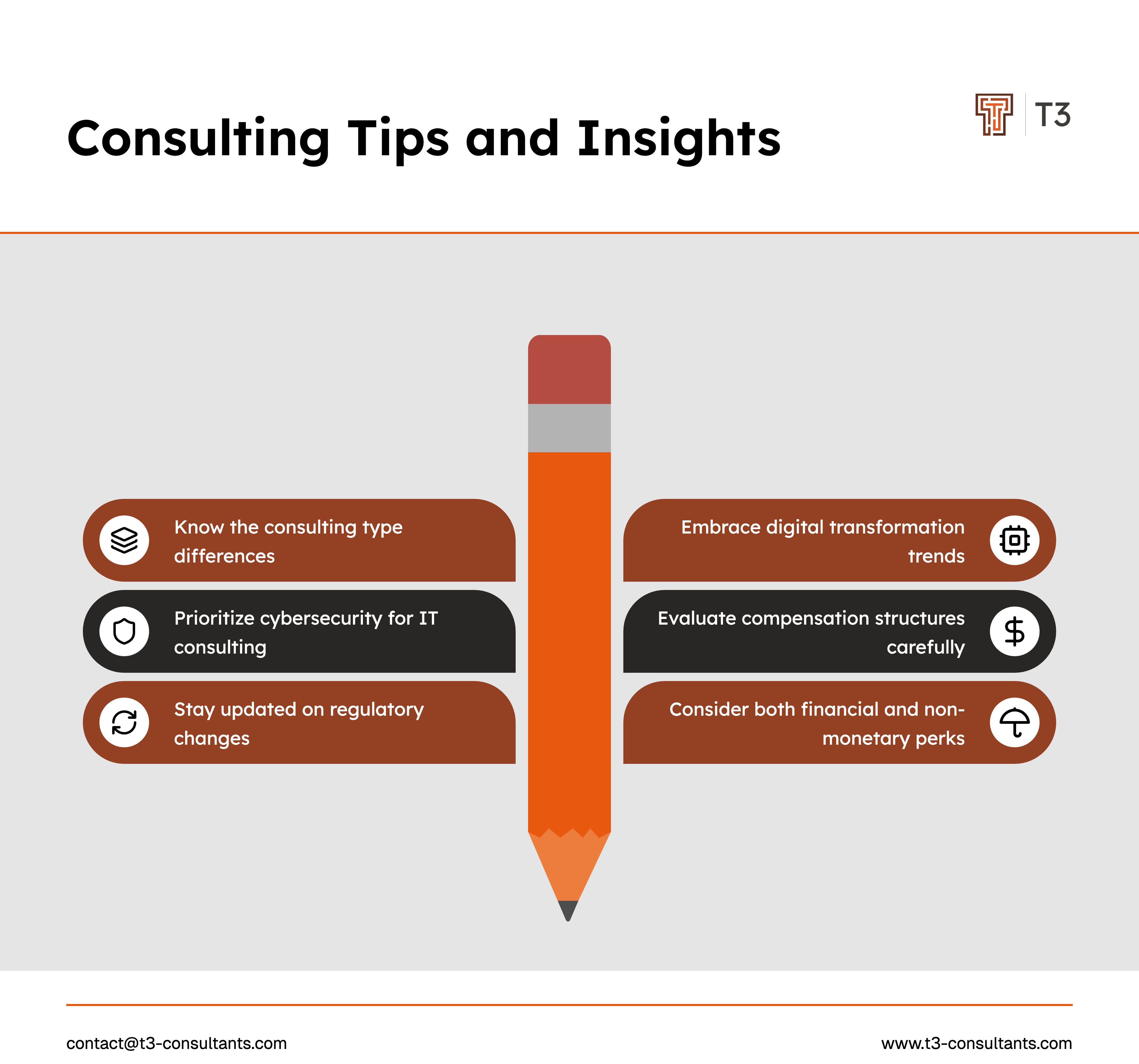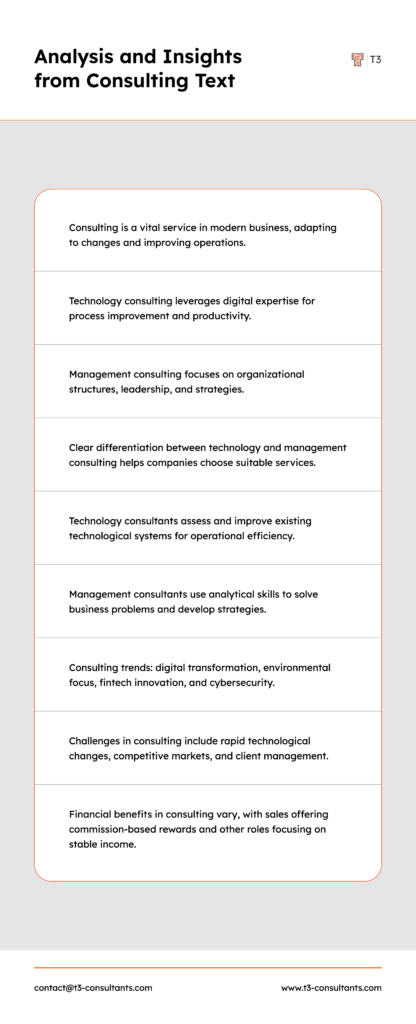
Technology vs Management Consulting: Key Differences
Introduction
Consulting is a critical service in the ever-changing business environment of our time, helping companies to fine-tune their operations and adapt to new challenges. Consulting is an expert-led service providing strategic solutions to improve business performance. Knowing the difference between technology and management consulting can guide companies looking for the right advice.
Technology consulting uses the latest digital know-how to improve processes and increase productivity. It includes expertise in fields such as IT infrastructure, software development, and cybersecurity. Whilst management consulting focuses on getting the organizational structure right, the leadership team right, and getting the strategy right. It deals with human resources, financial management, and operational efficiency.
Having a clear picture of this divide allows companies to choose the best consulting solution to meet their specific needs and achieve sustainable success and innovation in today’s competitive business world.
Technology Consulting: An Overview
Technology consulting is an essential service in the modern tech-driven world. It entails advising businesses on how best to use technology to meet their objectives. As organizations become more dependent on technological tools to drive productivity, security, and innovation, the role of technology consultants in assisting firms of all sizes becomes increasingly important. These experts work to connect advanced technological solutions to business needs to help organizations improve their operational efficiency through technology integration.
Central to technology consulting is the thorough assessment of a client’s existing technological systems and business processes. In this context, technology consultants help identify areas for improvement, propose robust solutions, and help deploy new technologies that allow the integration of tech resources in parallel with business strategy. They possess broad expertise in varying technology areas, including IT management, cybersecurity, software development, data analytics, among others, allowing them to offer qualified advice and strategic direction with respect to making technology work for the client.
The role of a technology consultant goes beyond advisory services. They engage directly with clients to understand their unique challenges and future goals. This may involve exhaustive analysis and validation, customized strategy development, technology implementation oversight, collaboration with the client’s IT and other relevant departments, as well as training and support to ensure technology use and adoption. Furthermore, technology consultants remain updated on emerging technologies to provide state-of-the-art advice and to ensure that their clients stay ahead in a competitive space.
A career in technology consulting can be both lucrative and dynamic, affording individuals the opportunity to work in different industries and solve diverse technology challenges. As companies continue to seek efficient tech solutions, there is a growing need for expert technology consultants. Ultimately, they not only improve client performance but also foster innovation, growth, and the reshaping of businesses in an evolving digital environment.
Management Consulting Overview
Management consulting is the practice of lending expertise to help organizations improve performance and efficiency. Simply put, management consultants take analytical and business skills and use them to help organizations solve problems and develop strategies. This can be for the purpose of finding ways to operate in a more cost-effective manner, or merely to generally advise a company on how to meet its goals.
A job in management consulting is a great fit for those interested in data analysis, business, and, of course, strategic thinking and problem-solving. The day-to-day job of a management consultant may involve gathering data and identifying solutions to problems faced by their client. In other words, regardless of industry or market, the work will involve identifying solutions to their problems to improve their market position.
Management consulting requires good analytical and thinking skills, as well as the ability to communicate effectively. This involves a good grasp of the many aspects that constitute a business, its strengths and weaknesses, etc. Consultants also frequently work in teams and must be able to interface effectively with a customer’s executive team to offer recommendations on the many business issues the customer is facing, from operational efficiency to moving into new markets.
Management consulting is a career particularly well-suited to those who enjoy challenging and varied projects, and the chance to work and interact with businesses across all industry sectors. Typically, consultants work at least 50-60 hours a week, and travel can be demanding as consultants are often on-site at the client’s place of business, working directly with key decision-makers. A management consulting career offers great learning opportunities. It can provide the opportunity to make a real difference within a business and offer real professional and personal growth.
In summary, management consulting is multi-faceted with the goal to help companies shape and sustain corporate strategies, structures, management, and operations for long-term success. Consultants leverage business acumen and strategic thoughts and help businesses find scalable growth in a competitive market.
Key Differences
Exploring different industries requires knowing the key differences so you can make more informed career decisions. This section will explore this through the comparison of skills needed in each area, and the career paths, and opportunities available.
Let’s start by comparing the required skills in each sector. Individual industries value specialized skill sets to meet specific industry needs. For example, the technology sector values the ability to code in languages like Python and Java. The technical skills like this are often required to enter industries like software development or data analytics. On the other hand, marketing backgrounds value strong skills in communication and strategic planning. Thinking creatively and being able to analyze consumer behavior is critical here. The skill of being adaptable and always learning will tend to be a common skill relevant across multiple industries, showing there are similarities even among differences.
Exploring career paths and progression shows further differences. Healthcare career paths may be more progressive, moving from education to residency and to specialization. Progress is often guided by a strict licensing system and so your progress may be dictated for you. However, tech has more rapidly variable career paths possible. You may start as a junior developer and then progress onto a lead developer or move sideways into project management. The flexibility in tech allows you to try different roles within an organization or different employers.
Job opportunities are very different as well. Tech, for example, is expanding with a huge growth in roles such as software developers, cybersecurity experts, and UX designers. These careers often offer a high salary, and flexibility with a lot of opportunities for remote work and more flexible working patterns, a growing feature of the modern working landscape. Education, for example, is more stable traditionally and offers careers from teaching to leadership roles in administration but maybe with lower financial rewards than in tech. The opportunity to be shaping the future generation is a reward in itself for some.
To sum up, understanding the skills needed and job opportunities in different industries can guide you towards a career that suits you best. Analyzing the differences between jobs can help you identify where your own strengths and interests lie and, therefore, what jobs may be more likely to provide the growth, satisfaction, and success you desire.

Industry Trends and Challenges
Staying current with industry trends and mastering the challenges inherent in the consulting profession are key to achieving success. Each type of consulting presents opportunities and roadblocks, requiring professionals to adapt as needed.
Consulting Field Trends
In management consulting, the major trend is digital transformation. Companies are turning to consultants to help them use the latest technology such as artificial intelligence (AI) and data analytics to improve business operations and stay ahead of the competition. The demand for environmental consulting is increasing as companies are making sustainability a priority with customer and regulatory expectations. Consultants in this area are helping companies figure out the complexities of going green and remaining compliant.
Financial consulting, on the other hand, is putting the spotlight on fintech innovations. Consultants are helping companies make the most of blockchain, mobile payments, online financial services, and other such technological developments to make operations and customer service smoother. In IT consulting, the emphasis is squarely on cybersecurity, with companies needing protection against an ever-increasing number of cybersecurity threats.
Common Challenges for Consultants
There are still plenty of serious challenges that consultants face. Primary among them is the rapid pace of technological and regulatory change, requiring ongoing training and adaptation if one is to remain relevant and valuable to customers.
Consulting is competitive too. Success in a cluttered market means differentiating one company’s services and creating a credible brand, which is only possible with smart marketing and unwavering service. And then there’s the work of managing client expectations and delivering quantifiable outcomes, issues that all consultants are forced to wrestle with in order to satisfy customers and generate more work in the future.
Financial Benefits and Compensation: Optimizing Your Earnings Potential
In today’s competitive job market, knowledge of the intricacies of financial benefits and compensation structures can help elevate your career, whether you are entering a sales position or another high-paced role. Variations in industries make it important to assess salary expectations properly. Sales roles, for example, typically offer a stable base pay along with an attractive commission structure which rewards top performers capable of generating significant revenue. Consequently, sales is an appealing industry for ambitious individuals.
Conversely, other professions may feature a fixed income and financial benefits that promote consistency, such as health packages, retirement savings schemes, and an annual bonus, for a full financial package. Understanding these structures is key for prospective employees wishing to align themselves with their desired financial positions.
Moreover, it is important to consider wider benefits. Non-monetary perks (e.g., flexible working hours, personal development courses, and paid leave) can substantially boost job satisfaction and financial health. With any industry, evaluating the monetary and non-monetary compensation packages provides a route that fulfills your financial and professional goals, guaranteeing a successful career.
Overall, knowledge of the differences in consulting paths can greatly influence your career fulfillment. Whether you’re interested in management consulting and its strategic imperative or operations consulting and its process improvement objectives, compatibility with your strengths will be key. Think about how much you enjoy problem-solving and the extent to which you’re comfortable with rotation. Think about the future and the types of projects that excite you. By taking these elements into account, it’s possible to find a consulting career that not only matches your professional ambitions but also provides enduring contentment.
